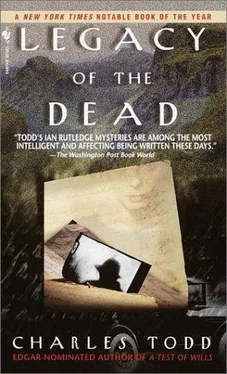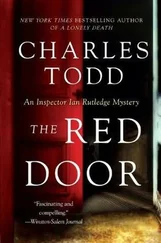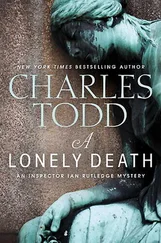Charles Todd - Legacy of the Dead
Здесь есть возможность читать онлайн «Charles Todd - Legacy of the Dead» весь текст электронной книги совершенно бесплатно (целиком полную версию без сокращений). В некоторых случаях можно слушать аудио, скачать через торрент в формате fb2 и присутствует краткое содержание. Жанр: Полицейский детектив, на английском языке. Описание произведения, (предисловие) а так же отзывы посетителей доступны на портале библиотеки ЛибКат.
- Название:Legacy of the Dead
- Автор:
- Жанр:
- Год:неизвестен
- ISBN:нет данных
- Рейтинг книги:5 / 5. Голосов: 1
-
Избранное:Добавить в избранное
- Отзывы:
-
Ваша оценка:
- 100
- 1
- 2
- 3
- 4
- 5
Legacy of the Dead: краткое содержание, описание и аннотация
Предлагаем к чтению аннотацию, описание, краткое содержание или предисловие (зависит от того, что написал сам автор книги «Legacy of the Dead»). Если вы не нашли необходимую информацию о книге — напишите в комментариях, мы постараемся отыскать её.
Legacy of the Dead — читать онлайн бесплатно полную книгу (весь текст) целиком
Ниже представлен текст книги, разбитый по страницам. Система сохранения места последней прочитанной страницы, позволяет с удобством читать онлайн бесплатно книгу «Legacy of the Dead», без необходимости каждый раз заново искать на чём Вы остановились. Поставьте закладку, и сможете в любой момент перейти на страницу, на которой закончили чтение.
Интервал:
Закладка:
He set his empty cup on the tray. Check. And mate.
Hamish, in the ensuing silence, said only, “Well done!”
It was rare praise. Rutledge had no time to savor it.
Lady Maude said, “If your information comes from Grace Talbot-Hemings-now Mrs. Atwood-I’m sure she reported the conversation exactly as it happened. She was a truthful child and has no doubt grown into a truthful young woman. This is not to say that what my daughter told her is to be believed. On the contrary, Eleanor might well have left a false trail if she had found passage to the United States and wished to be absolutely certain that no one stopped her. This would also explain her great distress, as you call it.”
Rutledge had to admit that it did.
Lady Maude was not easily broken. She had been the mistress of a king and knew her worth. She had known her daughter’s worth as well, and lived to see Eleanor turn her back on it.
Rutledge thought: Eleanor died in her mother’s heart in 1916. And he suddenly knew why. The daughter Lady Maude had given up her own self-respect to bear to a Prince of Wales had not been worthy, in her mother’s eyes, of such sacrifice. Eleanor had neither understood nor appreciated the burden her mother carried, and if anything had, in her youthful rebellion, mocked it.
For the most fleeting instant of time, he wondered if Lady Maude might be capable of killing her only child.
Lady Maude also set her cup on the tray with firm finality. “You must realize, Inspector, that your”-she hesitated delicately-“small successes, as you call them, are proving to be a reflection on my daughter’s character that I find unacceptable. You will not pursue them.”
“Aye, she doesna’ want to learn that her daughter was pregnant,” Hamish said. “If it damns Fiona, neither do I!”
“I have no choice in the matter,” Rutledge said, “I am trying now to locate this man Burns. He should be able to lead us to the next step. Where Miss Gray went in Scotland. And why.”
Lady Maude rose. “I must thank you for your courtesy in reporting your information to me in person. I expect we shall not meet again.”
Dismissal. Permanent dismissal, Hamish pointed out.
Rutledge stood as well. “I shall respect your wishes. Would you prefer a written report to a message by telephone when I’ve completed my investigation?”
Their eyes locked. Hers a deep violet with her anger, and his a mirror of his voice, official and unyielding.
For a full twenty seconds she said nothing, waiting for him to look away first.
Then she snapped, “I can break you, Inspector.”
“No doubt,” he answered. “But it will not change the truth, nor will it give you great satisfaction. Good day, Lady Maude.”
He had reached the door before her voice stopped him.
“You will find nothing connecting my daughter to those appalling bones!”
He turned, and for a moment looked at the room enclosing them with such elegance and formality. “That’s my hope as well. It will be a great tragedy if I do. For many people.”
As the door began to close on his heels, he heard her voice, commanding and clear but not raised. “Inspector.”
He stepped back in the room. Nothing had changed in her face. She said only, “It is fortunate, is it not, that my daughter has found a champion in you. I fear that I have been hurt too often. It is difficult to summon the courage to face another disappointment. But I shall try.”
He inclined his head. It was, in its way, a salute. And an apology.
This time she didn’t stop him as he left.
Hamish, digesting the last exchange, said only, “I canna’ say that walking with the great is the road to happiness.”
No, Rutledge silently answered. That woman has paid a dear price.
An hour after leaving Menton, Rutledge found a telephone in the next town and put in a call to his godfather.
Morag answered the telephone and went to find David Trevor.
He said, taking up the receiver, “Ian? I hope this means you’re coming to dinner!”
“I won’t make it to Scotland in time. It’s late and I’ve had three days of hard driving. No, it’s information I need, sir. You told me earlier that you knew the procurator-fiscal in the MacDonald case. Well enough to tell me anything about his family?”
There was an instant of silence, then David Trevor said, “Yes, I can give you what I know. He married a young woman from the neighborhood of Stirling. If I remember, her father was a lawyer, and a brother was a judge. I think I met her once or twice at some official gathering. They had three children. Cathy, the daughter, is married to an Englishman and they live in Gloucester. George, the older son, is with a London firm. The youngest, Robert, is dead.”
“Did either son serve in the war?”
“George was in the Navy. Invalided out in late ’17. Robert was killed in France. Artillery. Early 1916, I think.”
“Was Robert married?”
“No, there was a girl in Edinburgh whom he was unofficially engaged to. It was an understood thing, but no announcement had been made. Then she died of appendicitis. I don’t know quite when-well before Robert was killed, certainly. In the winter of ’15, I think it was. Why this sudden interest in Robert?”
“I don’t know,” Rutledge said truthfully. “Could you describe him?”
“He was dark, and well set up. And I’m told he had the most wonderful wit. Ross had heard him offering the toasts at a wedding, he had the guests bent double with laughter. He said that Robert could have stood for Parliament if he’d wanted to go in that direction. But he was interested in law or banking, I forget which.” Rutledge could almost hear the smile in Trevor’s voice. “Have I earned a consulting fee for my knowledge of Scottish social circles?”
“Without doubt! Thank you, I appreciate your help.”
“Will you be coming again, Ian? Before you leave Scotland?”
There was a quiet longing in the seemingly casual question.
“As soon as I can,” Rutledge promised, and said good-bye.
Another night on the road saw Rutledge back in Duncarrick, tired and out of sorts. He stopped at the police station before he went to the hotel, and asked to speak to Fiona.
McKinstry was on duty, and he said diffidently, “You’ve been away, I think.”
“Yes, there was business outside of London to see to.”
McKinstry took him back and opened the door himself, smiling at Fiona. He said wistfully to Rutledge, “Shall I stay and take notes?”
“No, no, it isn’t necessary.” He waited until McKinstry was out of earshot down the hall before going into the small cell and closing the door behind him.
Fiona, with nothing to say, watched his face. Rutledge bade her a good morning, and then asked, “There was a Scottish officer who was well known to Eleanor Gray. Robert Burns, called Robbie by his friends. Did you ever meet him?”
She answered, “The only Burns I know is the fiscal. He isn’t young enough to have been in the war. He lives in Jedburgh.”
Rutledge said, “Yes. Well, it doesn’t matter.” He gestured for her to sit, and she looked first at the cot and then at the single chair, and chose the cot, perching herself stiffly on the edge of it. Rutledge took the chair and said conversationally, “Fiona, why do the people of Duncarrick dislike you?”
“Do they?”
“They must. They believed the scurrilous letters about you. They believe now that you’re capable of murder. Would you have picked out, say, the Tait woman at the hat shop as a murderer? Or the young woman who keeps house for the minister? Would you find it easy to believe people who claimed they were whores and worse?”
She flushed.
“But people believed these things about you. If I can discover why, I might know who is behind the lies. It will be a beginning.”
Читать дальшеИнтервал:
Закладка:
Похожие книги на «Legacy of the Dead»
Представляем Вашему вниманию похожие книги на «Legacy of the Dead» списком для выбора. Мы отобрали схожую по названию и смыслу литературу в надежде предоставить читателям больше вариантов отыскать новые, интересные, ещё непрочитанные произведения.
Обсуждение, отзывы о книге «Legacy of the Dead» и просто собственные мнения читателей. Оставьте ваши комментарии, напишите, что Вы думаете о произведении, его смысле или главных героях. Укажите что конкретно понравилось, а что нет, и почему Вы так считаете.












